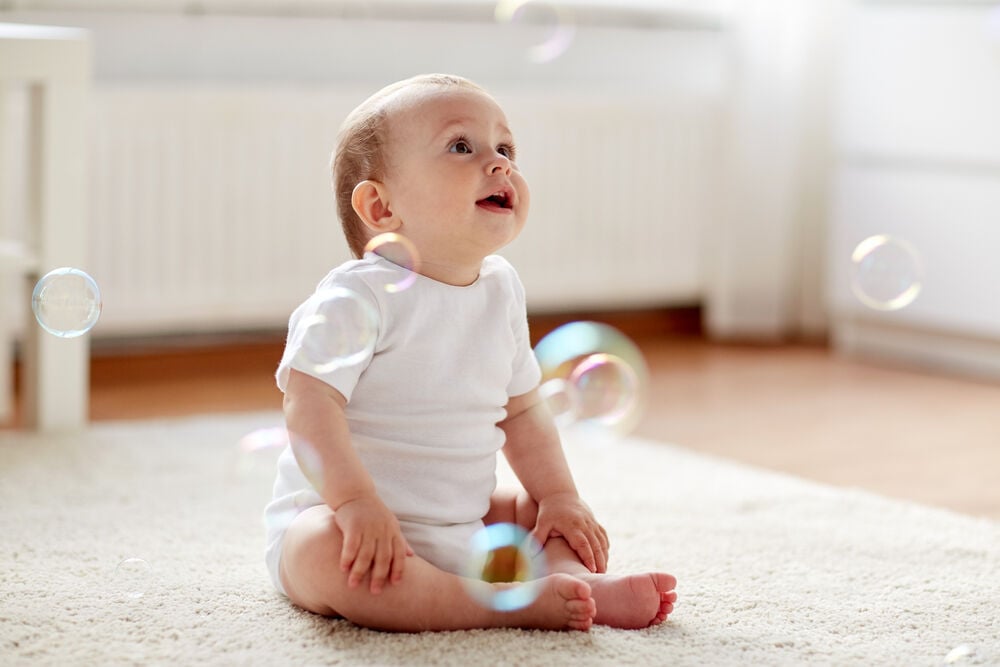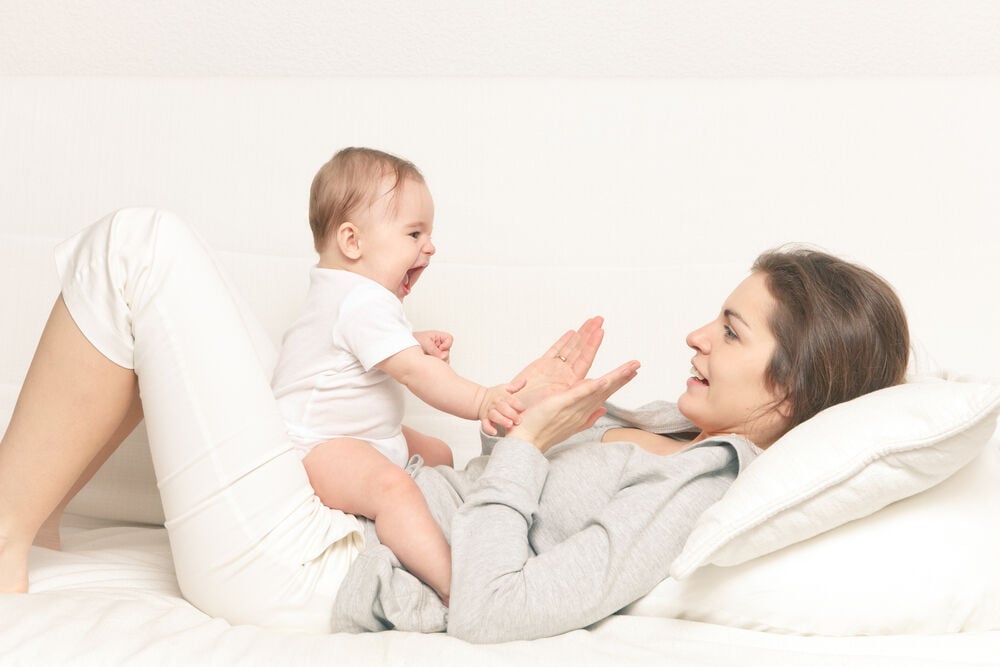Babies grow fast, and lots of games and activities can help them develop — and have fun, too. Your baby may be waving, babbling, gurgling, nodding, smiling, and moving their hands and legs.
-
Tracking cycle
-
Getting pregnant
-
Pregnancy
-
Help Center
-
Flo for Partners
-
Anonymous Mode
-
Flo app reviews
-
Flo Premium New
-
Secret Chats New
-
Symptom Checker New
-
Your cycle
-
Health 360°
-
Getting pregnant
-
Pregnancy
-
Being a mom
-
LGBTQ+
-
Quizzes
-
Ovulation calculator
-
hCG calculator
-
Pregnancy test calculator
-
Menstrual cycle calculator
-
Period calculator
-
Implantation calculator
-
Pregnancy weeks to months calculator
-
Pregnancy due date calculator
-
IVF and FET due date calculator
-
Due date calculator by ultrasound
-
Medical Affairs
-
Science & Research
-
Pass It On Project New
-
Privacy Portal
-
Press Center
-
Flo Accuracy
-
Careers
-
Contact Us
Things to Do With a 6-Month-Old Baby: Activities, Games, and Much More


Every piece of content at Flo Health adheres to the highest editorial standards for language, style, and medical accuracy. To learn what we do to deliver the best health and lifestyle insights to you, check out our content review principles.
At this stage, you may already be communicating with your baby, which makes it even more fun. To enhance their development further, interact with your child on a regular basis. Read on to learn some of the things you can do with a 6-month-old baby.
What should your 6-month-old be doing?
Your 6-month-old baby will probably be interested in everything around them. They may find every tiny thing exciting and are probably learning something new every day. What do 6-month-old babies do? At 6 months, your baby is developing motor skills and may be able to do some of these activities:
- Rolling on their back
- Sliding back and forth on their tummy
- Rocking back and forth on their knees
- Rolling over and sitting up without support
Your baby is probably chewing on objects and also holding and handling them. They are beginning to learn about interaction and activities related to movement. At this age, babies start grasping languages and their speech patterns start developing. They may start to make noises and become more responsive to you.
What to teach a 6-month-old
By 6 months, your baby is learning and engaging in a lot of new things. Experiences can greatly affect the development of your child's brain, and babies are particularly vulnerable to consistent negative influences at this age. On the other hand, positive experiences at this early age have a huge effect on the chances of your child's success, happiness, and achievement in life.
Put your baby on your lap and point out colorful things in your environment. You can make them clap, read books to them, and sing lullabies. You can also try helping them sit up on their own. Your baby may start babbling by this age; you can help further develop their language skills by reading stories together every night.
Have been using Flo for 2 years now. It has been extremely informative during my monthly cycles as well as during my pregnancy. Flo gives great information on baby's and mother's body'; surveys and discussion platforms keep you more informed on the topic.
Games to play with a 6-month-old baby
Your baby may be able to play more physical games at this age. They may enjoy tickle games or knee rides. Some fun games you can play with 6-month-old babies include:
Peekaboo
This fun game may make your baby laugh when they see your face pop up suddenly. You can play peekaboo by covering your face and pretending like you're hiding from them. Then show your face and say "Peekaboo!". Your baby will probably giggle uncontrollably.
This is a great game for helping develop the fine motor skills of your 6-month-old baby. This game also teaches the concept of object permanence. When babies learn object permanence, they understand that people or objects exist even when they aren't visible.
Kicking
As your child grows, they play more and start enjoying physical activities. Kicking is one of the games that can help integrate the sensory and physical developmental skills of 6-month-old babies. Take some colored pieces of cloth — like napkins or burp cloths — and tuck them under the cushions of the sofa with a bit hanging over, like a curtain.
Place your baby on their back with their feet touching the cloth and their knees bent. Your baby will begin kicking the piece of cloth with their feet. This game helps your baby learn chin tucking, sensory integration, cause and effect, and body awareness.
Tummy time
Tummy time is important, even if your baby protests loudly. Try lying on the ground with your child. Look them in their eyes while you are on your belly. You can lay your child on a soft towel and roll them gently from one side to the other.
Make bubbles
Take a quiz
Find out what you can do with our Health Assistant

At this age, your baby is able to see far enough that they may be able to focus on bubbles. You can blow bubbles for your baby while they're in the bathtub or if they are out of the house and getting cranky. Bubbles make an easily transportable, cheap, and fascinating game for 6-month-old babies.
Activities to do with a 6-month-old
This is a great time to interact with your 6-month-old baby to boost their mental, physical, social, sensory, and emotional development. Some activities that may help boost the overall development of your 6-month-old baby are:
Singing
Parents have been singing lullabies to their babies for ages. You can introduce your baby to the soothing world of music by singing to them. You can be creative, making up songs and singing them to your child.
You can sing songs during bath time or any other activity. Sing fast and slow, change your pitch, and try different funny voices to teach your baby auditory discrimination. Singing introduces your baby to sounds and how to differentiate between them.
Clapping

Clapping is another activity that your 6-month-old baby will enjoy. Encourage your child to clap themselves and clap along with them. Clapping produces sound, so it gives them extreme joy. You can take your baby's hands in your own and gently make the clapping motions for them.
You can also encourage your baby to copy or imitate you. You can make clapping more interesting and fun by using songs or rhymes. Clapping can help your 6-month-old baby learn imitation and about different sounds.
Reading
When your baby is 6 months old, you may already be reading to them. Try books with tactile components and pictures. Make sure to read slowly and add emotions and gestures while reading. Encourage your child to act surprised or laugh to make the activity more interactive.
Choose books that are colorful, short, and have lots of pictures. Since babies at this age may chew books, pick thick ones (like board books) that are designed especially for them. Reading helps develop the listening and language skills of 6-month-old babies. It also helps in the development of touch and sight.
Flying
Making your baby fly is a great activity for 6-month-olds. Put your baby on your lap with their tummy facing down. Hold onto them with both hands. Carefully supporting their midsection, gently lift your baby up and down, forwards and back. Your baby will laugh loudly and enjoy the surprise of zooming around in different directions. Flying like this helps stimulate and strengthen your 6-month-old's body.
Sit-ups

Muscle strength is very important for a growing infant. Even babies can use sit-ups to help strengthen and tone! As long as your baby has good head control, you can lay them on their back and gently guide them to a slightly seated position.
Holding onto your baby's hands, lower them onto their back and then back up, just like a sit-up. This is a great activity for enhancing the head control and motor skills of your 6-month-old baby.
By 6 months, your baby is learning and becoming engaged in a lot of new things. Babies at this age grow rapidly, and there are lots of activities and games that can help them develop quickly and have fun at the same time.
Some great games and activities for 6-month-old babies include peekaboo, kicking, tummy time, making bubbles, singing, clapping, reading a book, flying, and doing sit-ups. No matter what you do, playing games and interacting with your baby helps enhance their development.


Hey, I'm Anique
I started using Flo app to track my period and ovulation because we wanted to have a baby.


The Flo app helped me learn about my body and spot ovulation signs during our conception journey.


I vividly
remember the day
that we switched
Flo into
Pregnancy Mode — it was
such a special
moment.
Real stories, real results
Learn how the Flo app became an amazing cheerleader for us on our conception journey.




